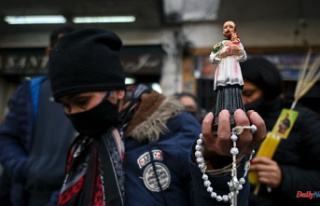It is a precarious truce after three days of hostilities, which entered into force on Sunday August 7 at 11:30 p.m., and negotiated by Egypt, the historic intermediary between Israel and the Palestinians. It concerns the Palestinian armed group Islamic Jihad and Israel, as Israeli strikes on the Gaza Strip claimed the lives of 44 Palestinians, including 15 children, according to the Hamas Health Ministry. This Monday, August 8, that truce seemed to be holding firm so far, with no side reporting any major breaches of the agreement.
The crossing points between the Jewish state and the Gaza Strip, closed Tuesday August 2 by Israel, were reopened "for humanitarian needs on Monday", announced in a press release the Cogat, the organ of the Israeli Ministry of Defense. which oversees civilian activities in the Palestinian Territories. The closure of these crossings had forced thousands of Gazans, holders of work permits in Israel, to stay at home, and had slowed the delivery of diesel fuel, usually trucked in from Egypt or Israel and needed to supply the Gaza power station.
After two days of shutdown for lack of diesel, the only power plant in the Gaza Strip, a territory plagued by poverty and unemployment where the Jewish state has imposed a strict blockade since 2007, restarted on Monday after the delivery of fuel from Israel, as announced by Mohammed Thabet, the spokesman for the electricity company, to AFP. The Gaza electricity distribution company warned in a statement on Saturday August 6 that the shutdown of the power plant "would affect all public services and critical infrastructure and exacerbate the humanitarian situation".
It was the arrest Monday, August 1 in the occupied West Bank of Bassem Saadi, a leader of Islamic Jihad in this Palestinian territory occupied since 1967 by Israel, which led to the current outbreak of violence. The Israeli army presented its operation as a "preemptive attack" against Islamic Jihad, justifying it by their fears of reprisals from Islamic Jihad after the arrest of Bassem al-Saadi.
On Friday August 5, the Israeli army struck the Gaza Strip, an enclave of 2.3 million inhabitants controlled by the Islamists of Hamas where Islamic Jihad is very present. That day, Israeli Prime Minister Yair Lapid said on television that the Israeli army was carrying out a "precise counterterrorism operation directed against an immediate threat". "Islamic Jihad is a proxy for Iran that wants to destroy the State of Israel and kill innocent Israelis. (...) We will do whatever it takes to defend our people," the prime minister added. Israeli.
The main military leaders in Gaza, Tayssir Al-Jabari and Khaled Mansour, were killed during this Israeli operation as well as several fighters of the group. The death of the military leaders had been confirmed by the Islamic Jihad, considered "terrorist" by Israel, the United States and the European Union. Yair Lapid called the strike that killed Khaled Mansour on Saturday an "extraordinary result". On Saturday evening, Oded Basiok, the head of the operations department of the Hebrew State army, sent a press release to AFP in which he affirmed that "the senior leadership of the military wing of the Islamic Jihad in Gaza had been neutralized." In addition, in recent days, some 40 Islamic Jihad operatives have been arrested by Israeli forces in the West Bank.
"The battle is just beginning," said Mohammed Al-Hindi, an Islamic Jihad official. In retaliation for the Israeli operation, Al-Quds, the armed wing of the Palestinian group Islamic Jihad, announced on Friday that it had fired "more than 100 rockets" from the Gaza Strip towards Israel, its "first response" to Israeli strikes on the Palestinian enclave who targeted her. "The Islamic jihad wants to show that it is not crushed by the pressure exerted by the Israeli army and wants to demonstrate its response capabilities," said David Rigoulet-Roze, associate researcher at IRIS, to BFMTV.
Islamic Jihad had accused the Jewish state of having "started a war". "The Zionist enemy started this aggression and must expect us to fight relentlessly," its secretary general, Ziad al-Nakhala, said Friday in an interview with Lebanese television Al-Mayadeen in Tehran. the Iranian capital.
The Israeli offensive "exposes to the whole world the crimes and massacres committed by the Israeli occupation against the Palestinians in Gaza", said Fawzi Barhoum, a spokesman for the armed Islamist movement Hamas, in power in Gaza. "Israel was waiting for a reaction from the Islamic Jihad after arresting the leader and without a reaction Israel decides, alone, to launch a murderous attack against the Gaza Strip. Israel is in the process of judging the intentions and justifying its attacks by fears", for his part estimated with franceinfo Hala Abou-Hassira, ambassador and head of the Palestine mission in France.
The confrontation between Israel and Islamic Jihad, which opposes any negotiation with Jerusalem and rejects the Oslo Accords, signed by the Palestinian Authority and the Jewish state in 1993, is the worst since that between Israel and Hamas in May 2021. The latter had killed 260 Palestinians in eleven days, including combatants and 14 dead in Israel, including a soldier, according to local authorities.
According to Islamic Jihad, the truce agreement provides, among other things, "Egypt's commitment to work for the release of two prisoners" from Islamic Jihad in the hands of Israel: Bassem al-Saadi as well as Khalil Awawdeh, detained in an Israeli prison since December 2021. On Sunday, Yair Lapid's office stressed that his country "reserves the right to respond firmly to any violation". In Gaza, where it is based, the Islamic Jihad confirmed that it would "cease hostilities", but also warned that it reserved "the right to respond to any (new) Israeli aggression".












